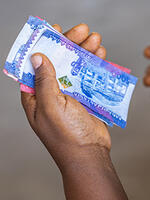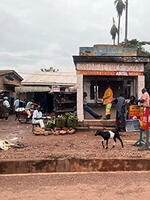Filter by...
Reset all
Publications (227)
Technical Note
pdf
This technical note describes the Uganda Revenue Authority (URA) presumptive tax returns data covering financial years from 2015/16 to 2022/23. The data contains 21 variables, including information on taxpayers’ characteristics, turnover, and payable taxes. It covers the population of small...

Rising public debt in Africa, exacerbated by multiple shocks and limited fiscal space, poses a significant challenge to the region’s development. Half of the low-income countries in sub-Saharan Africa (SSA) are in debt distress or at high risk of it, as calls for international action, such as...
Journal Article
This peer-reviewed research is available free of charge. UNU-WIDER believes that research is a global public good and supports Open Access.
COVID-19 pandemic, household welfare and diversification strategies of smallholder farmers in Uganda
Agricultural activities in many sub-Saharan African (SSA) countries are subject to various risk factors that the COVID-19 compounds. Earlier studies on the effect of COVID-19 on smallholders neglect the issue of comparison with non-farm households. The study uses micro-level household datasets to...
Report
pdf
This report documents UGAMOD, the SOUTHMOD model developed for Uganda. This work was carried out by Uganda Revenue Authority (URA) and Makerere University in collaboration with the project partners. The results presented in this report are derived using UGAMOD version 2.1, which is part of the...
Blog
Uganda, with a fiscal deficit of 5.6% in 2023, has increasingly turned to local resources to make up for its revenue shortfall since the World Bank suspended its funding on 8 August 2023 over the country’s anti-homosexuality law. In early April 2024, traders in downtown Kampala protested against...
Working Paper
pdf
– Comparing the performance of universal basic income in Uganda and Zambia during COVID-19
The debate over universal basic income (UBI) has gained traction in the developing world in recent years. We analyse the effects of four UBI schemes on poverty and inequality measures during normal times and times of crisis in Uganda and Zambia. We use static microsimulation models and nationally...
Working Paper
pdf
Cross-border traders face a choice between official and unofficial border crossings. The latter allow them to evade taxes, but expose them to other risks, such as bribes, fines, and arrest. We investigate the perceptions of cross-border traders about the risks of trading officially vs unofficially...

Sovereign Wealth Funds (SWFs) have become a symbol of national success and a means for global, commercial and geopolitical influence. But how well do they contribute to national development goals? Furthermore, global decarbonization threatens the future of many fossil fuel-financed SWFs. Here, we...

While multinational corporations (MNCs) make up only 1.9% of firms operating in Uganda, they are overrepresented among tax holiday beneficiaries. New estimates reveal that Uganda’s revenue losses due to these tax expenditures peaked at USD 42 million in 2020.A new dataset allows for the first...
Blog
Sub-Saharan Africa has abundant natural resources and a substantial market, with an estimated population of 1.2 billion. The population is projected to grow by nearly 80% and reach almost 2 billion people by 2043. This population growth is expected to parallel an economic expansion, with annual...

Donors increasingly speak of locally led aid response, but often do not walk the walk. Case in point is the United States Agency for International Development (USAID), the humanitarian and development agency of the largest donor country in the world. In late 2021, USAID set a target that 25% of its...
Journal Article
This peer-reviewed research is available free of charge. UNU-WIDER believes that research is a global public good and supports Open Access.
When seeking to increase their tax revenues, policy-makers face a likely tradeoff between decreasing personal income tax rates (making formalizing more attractive and potentially contributing to revenue) and alternatively raising tax rates (potentially slowing down the formalization of the economy...
Blog
As we conclude the groundbreaking years of the 2019–2023 work programme on transforming economies, states, and societies, we reflect on the milestones achieved and anticipate the journey ahead.In 2019, I assumed the role of Director at UNU-WIDER and initiated the planning of the new work programme...
Working Paper
pdf
This paper studies the impact of the COVID-19 pandemic on formal sector employment in Uganda. Utilizing employee-level administrative tax data from the Uganda Revenue Authority, we describe the dynamics of employment as the pandemic evolved, seeking to better understand the various coping strategies...
Technical Note
pdf
This Technical Note describes Ugandan trade data covering import and export declarations for ten calendar years from January 2013 to December 2022, constructed from transactional-level Ugandan administrative data. The trade data series contains transaction-level ten datasets on imports and ten on...

– Combining tax data and Google Street View images
The issue of tax non-compliance among businesses is pervasive in many developing economies, including Uganda. But to what extent do businesses comply with their tax obligations in the capital city, Kampala? Can the local environment and geographic information help predict the risk of tax non...

Parts of Uganda that had centralised political systems before colonial rule are more likely to have higher rates of voluntary tax compliance. Merima Ali and Odd-Helge Fjeldstad look at why that might be the case.Voluntary tax compliance is an important source for domestic revenue in Africa as the...
Working Paper
pdf
– Challenges and prospects for Uganda
This paper simulates the impact of the global minimum corporate tax rate (GMCTR) in Uganda by estimating the difference between the mechanical and the behavioural changes in tax revenue. Overall, implementation of GMCTR will increase tax revenue, and the revenue increase is inversely proportional to...
Working Paper
pdf
– Evidence from Kampala, Uganda
This paper investigates business tax compliance in a multilevel tax structure with limited coordination. We study the case of Kampala, where firms are taxed at national and local levels—by the Uganda Revenue Authority and the Kampala Capital City Authority, respectively—and where the agencies...
Working Paper
pdf
Uganda has one of the lowest corporate income tax collection rates in sub-Saharan Africa, while offering generous corporate tax incentives. It is unclear whether tax incentives achieve their objectives without primarily benefiting firms, potentially undermining domestic revenue mobilization and...

The annual WIDER Development Conference held this year in Oslo concentrated on domestic revenue mobilization (DRM). The 2.5-day hybrid event emphasized both the progress made and unresolved problems in increasing economic autonomy and improving development prospects in the Global South.The...
Technical Note
pdf
This technical note describes the Uganda Revenue Authority (URA) Pay-As-You-Earn (PAYE) data covering financial years 2013/14 to 2021/22. PAYE is paid by an employer who withholds personal income tax on employees’ wages and other employment incomes like benefits and allowances. The data are...
Blog
Data is the key to informed decision-making in today's rapidly changing world. As nations strive to address complex economic challenges, data-driven insights have become indispensable. South Africa is no exception, facing issues like declining GDP per capita, sluggish productivity growth, and rising...

– How collaboration can help
UNU-WIDER has worked for several years in collaboration with sub-Saharan African revenue authorities to facilitate the analysis of digital tax data. During a visit to Kampala, Uganda this year, we asked our colleagues how this collaboration has been useful to them. How do they see their role going...

With the deadline for achieving the UN’s Sustainable Development Goals just seven years away, there is an increasing sense of urgency over the question of how to finance the ambitious framework, particularly in lower- and middle-income countries.Experts met at the recent WIDER Development Conference...
Blog
In celebration of South Africa's Women's Month, SA-TIED is spotlighting women driving change in economics. Through the 'Breaking Barriers, Building Economies: Women in Economic Policy' campaign, we highlight their achievements, challenges, and invaluable contributions. Pumla Bam, Senior Specialist...

There has been a revival of interest in the state’s role in economic development. Recent research argues that the most successful economies are those where effective states provide crucial public goods and services. The historical emergence of effective tax systems and the related processes by which...
Working Paper
pdf
– Evidence from Uganda
We investigate how the arrival and expansion of mobile network access in Uganda influences firm tax behaviour. Access to mobile technologies could broaden government revenues from corporate income tax through the extensive margin: by reducing the costs of formalization, it could increase the number...
Journal Article
This peer-reviewed research is available free of charge. UNU-WIDER believes that research is a global public good and supports Open Access.
Part of Journal Special Issue
Fiscal state capacity
Working Paper
pdf
– Evidence from personal income tax reform in Uganda
We evaluate a major personal income tax reform in Uganda that came into effect in 2012–13, contributing to the scarce literature on the effects of personal income tax reform on employees’ income in a low-income country in Africa. The reform increased the tax-free lower threshold, increased tax rates...

Across Kenya, Malawi, and Zambia, political candidates often attempt to buy the votes of the most socio-economically deprived communities. But new research from Prisca Jöst and Ellen Lust argues that social cohesion in these communities is instrumental in determining the levels of support for...

In Mozambique, Tanzania, South Africa, Uganda, and elsewhere, UNU-WIDER is on the ground to support national development plans, collect and create data for economic analysis and national and international policy processes, and build the capacity of government officials to develop national economies...
Displaying 32 of 227 results
 Join the network
Join the network